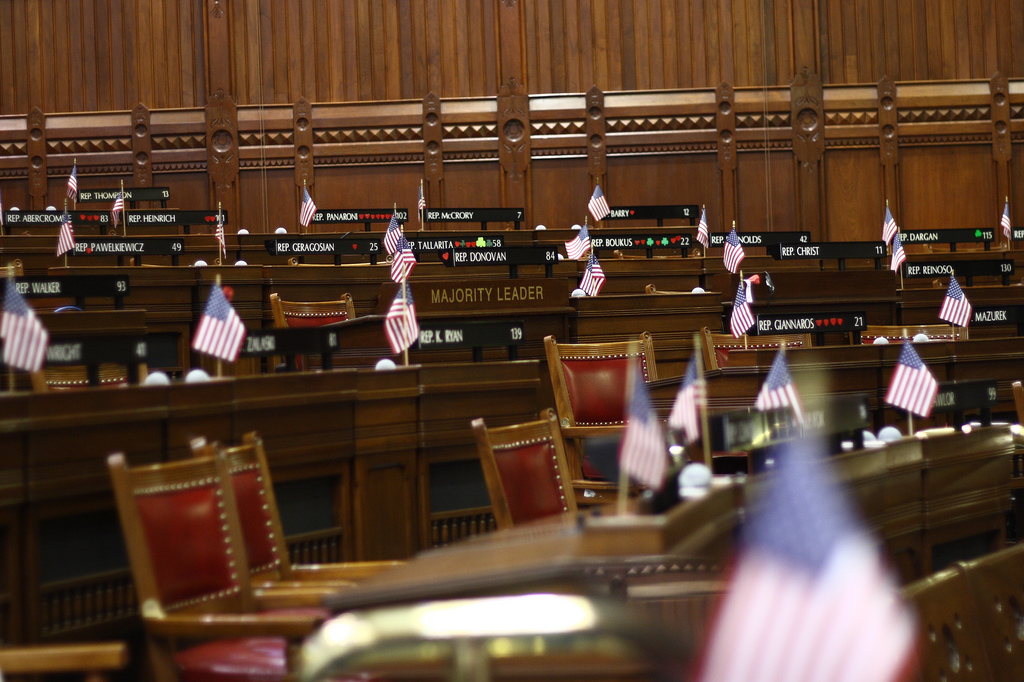Political Leaders

CT Lawmakers Push to Add Children and Hospital Patients to Medical Marijuana Program
[image:1 align:left caption:true]This week the General Law Committee of the Connecticut House and Senate gave its approval for a final vote to add children to the state's medical marijuana prog
What To Do About the Drug Trade in West Africa? [FEATURE]
Chronicle AM -- May 1, 2014

We're Winning Any Time the President is Forced to Say the Word "Legalization"
This MSNBC footage is pretty exciting to see.
New Biography Says Obama Smoked Pot -- A Lot
What's So Funny About the War on Drugs?
For all the progress that's been made towards bringing the drug policy debate into the political mainstream, there remains a tragic tendency among many in the press to burst out laughing at the idea of fixing our disastrous drug laws. The latest embarrassing example comes courtesy of Al Kamen in The Washington Post:
Members of Congress to Introduce Historic Legislation Ending Marijuana Prohibition (Press Release)

MEDIA ADVISORY June 22, 2011
Thursday: Members of Congress to Introduce Historic Legislation Ending Marijuana Prohibition
The Legislation, Modeled after the Repeal of Alcohol Prohibition, Comes on the 40th Anniversary of the Failed War on Drugs and on the Heels of a Global Commission Report Recommending Marijuana Legalization
Teleconference: Rep. Barney Frank and Leading Organizations Working to End the Failed War on Marijuana Explain the Significance of the Legislation
CONTACT: Morgan Fox, communications manager………………......(202) 905-2031 or [email protected]
WASHINGTON, DC - Rep. Barney Frank (D-MA) and Rep. Ron Paul (R-TX) will introduce bi-partisan legislation tomorrow, June 23, ending the federal war on marijuana and letting states legalize, regulate, tax, and control marijuana without federal interference. Other co-sponsors include Rep. John Conyers (D-MI), Rep. Steve Cohen (D-TN), Rep. Jared Polis (D-CO), and Rep. Barbara Lee (D-CA). The legislation would limit the federal government’s role in marijuana enforcement to cross-border or inter-state smuggling, allowing people to legally grow, use or sell marijuana in states where it is legal. The legislation is the first bill ever introduced in Congress to end federal marijuana prohibition.
Leading critics of the war on marijuana will explain its significance for state and national marijuana policy at a national tele-press conference on Thursday.
What: Tele-Press Conference on the Ending Federal Marijuana Prohibition Act of 2011
When:Thursday, June 23. 2:00pm EST / 11am PST
Call-in Info: 1-800-311-9404; Passcode: Marijuana
Who:
· Representative Barney Frank (D-4th/MA)
· Rob Kampia, executive director of the Marijuana Policy Project (MPP)
· Aaron Houston, executive director of Students for Sensible Drug Policy (SSDP)
· Allen St. Pierre, executive director of the National Organization for the Reform of Marijuana Laws (NORML)
· Bill Piper, director of national affairs for the Drug Policy Alliance (DPA)
Last week marked the 40th Anniversary of President Nixon declaring a war on marijuana and other drugs. In an oped in the New York Times last week, timed for the 40th Anniversary, former President Jimmy Carter called for reforming marijuana laws.
The legislation also comes on the heels of the Global Commission on Drug Policy, which released a report on June 2 calling for a major paradigm shift in how our society deals with drugs, including calling for legal regulation of marijuana. The report sent a jolt around the world, generating thousands of international media stories. The commission is comprised of international dignitaries including Kofi Annan, former Secretary General of the United Nations; Richard Branson, entrepreneur, founder of the Virgin Group; and the former Presidents of Brazil, Colombia, Mexico, and Switzerland. Representing the U.S. on the commission are George P. Shultz, Paul Volcker, and John Whitehead.
46.5% of Californians voted last year to legalize marijuana in their state, and voters in Colorado, Washington and possibly other states are expected to vote on the issue next year. In the past year at least five state legislatures have considered legalizing marijuana, including California, Maine, Massachusetts, Rhode Island, and Washington. 16 states and the District of Columbia have legalized marijuana for medical use, but the federal Drug Enforcement Administration (DEA) continues to arrest people under federal law and U.S. Attorneys have in recent months sent threatening letters to state policymakers in an apparent attempt to meddle in state decision-making.
Rep. Frank’s legislation would end state/federal conflicts over marijuana policy, reprioritize federal resources, and provide more room for states to do what is best for their own citizens.
With more than 124,000 members and supporters nationwide, the Marijuana Policy Project is the largest marijuana policy reform organization in the United States. For more information, please visit www.mpp.org.
####
Bills to Ensure Fair Treatment of Medical Cannabis Industry Members Are Introduced in U.S. House (Press Release)
National Cannabis Industry Association
For Immediate Release -- WEDNESDAY, MAY 25
Bills to Ensure Fair Treatment of Medical Cannabis Industry Members Are Introduced in U.S. House
The logic behind the introduction of the “Small Business Tax Equity Act of 2011” and the “Small Business Banking Improvement Act of 2011” stands in sharp contrast to the actions of U.S. Attorneys who hope to keep medical cannabis sales underground, untaxed and unregulated
CONTACT: Steve Fox, NCIA dir. of public affairs at 202-379-4861 ext. 2 or [email protected]
WASHINGTON, D.C. – Today, for the first time in history, two bills that would benefit members of the medical cannabis industry were introduced in Congress. The introduction of the bills, which address banking and tax issues faced by medical cannabis providers, follow months of advocacy by the National Cannabis Industry Association (NCIA). The bills were part of a coordinated introduction of three bills to protect and support medical marijuana patients and providers in states where the use of medical marijuana is legal. The third bill, the “States’ Medical Marijuana Patient Protection Act,” would modify federal law so that individuals acting in compliance with state law are immune from federal prosecution.
The industry bills were introduced with bipartisan lead sponsors. Rep. Pete Stark (D-CA) and Rep. Dana Rohrabacher (R-CA) are the lead sponsors of the “Small Business Tax Equity Act of 2011,” which would amend Section 280E of the Internal Revenue Code so that medical marijuana providers can take standard business deductions like any other business. The “Small Business Banking Improvement Act of 2011,” sponsored by Rep. Jared Polis (D-CO) and Rep. Ron Paul (R-TX), would allow financial institutions to work with medical marijuana businesses without the fear of running afoul of federal banking regulations.
These bills have been introduced at a time when the nation is witnessing a strange reaction by U.S. Attorneys to the development of state-regulated systems of medical marijuana distribution. In October 2009, the Department of Justice issued a memo to federal prosecutors, instructing them to de-prioritize the prosecution of individuals acting in compliance with state medical marijuana laws. This has given states like New Mexico, Colorado and Maine the ability to establish tightly regulated system. Yet some U.S. Attorneys, faced with the prospect of sensible regulations being established in other states, have issued misleading and threatening letters to sidetrack legislative and administrative progress.
“There are hundreds of thousands of medical marijuana patients in this country who benefit when they are able to purchase their medicine from safe, reliable and regulated establishments,” said Steve Fox, NCIA’s director of public affairs. “It is time for the federal government to acknowledge that these businesses are providing a service to their communities, not causing them harm. Without these regulated, tax-paying businesses, all medical marijuana sales would occur underground. The profits would bolster the criminal market and local, state and federal governments would receive no tax revenue. These medical marijuana providers are not looking for special treatment. They just want to be able to function in a manner similar to any other legal business. That is what these tax and banking bills would allow.”
* * * * *
The mission of the National Cannabis Industry Association is to defend, promote and advance the interests of the cannabis industry and its members. NCIA publicly advocates for the unique needs of the emerging cannabis industry and defends against those aiming to eliminate the legal market for cannabis and cannabis-related products. For more information, please visit www.TheCannabisIndustry.org.
####

A Big Day on the Hill (Action Alert)
| |
Dear friends, It’s not often that three bills related to medical marijuana are introduced in Congress on the same day. In fact, it has never happened in history – until today! This is big news, and we are hoping you will help spread the word in Washington. All three bills would benefit medical marijuana patients and their providers. The “States’ Medical Marijuana Patient Protection Act,” which has been introduced in past sessions of Congress, would modify federal law so that individuals acting in compliance with state law are immune from federal prosecution. The other two bills – the “Small Business Tax Equity Act of 2011” and the “Small Business Banking Improvement Act of 2011” – have never been introduced before and address critical tax and banking issues faced by medical marijuana centers and dispensaries as they attempt to serve patients, comply with statewide regulations, and pay their fair share of taxes. Having lobbied Congress for years on these issues, MPP is excited to see the sponsors of these pieces of legislation sending a strong message to the rest of the nation about the need for the federal government to respect state medical marijuana laws and to treat fairly the individuals following them. Now that these bills have been introduced, we need members of the House to sign on as co-sponsors. This is where you come in. We have drafted an email for you to send to your U.S. representative. With less than two minutes of your time, you can let your representative know that his or her constituents care about this issue. This really makes a difference. The tides of history are turning in our favor. But with people like you speaking out, they will turn even faster. Thanks for taking action! Sincerely,
| |
To contact MPP, please click here or reply to this e-mail. Our mailing address is Marijuana Policy Project, 236 Massachusetts Ave. NE, Suite 400, Washington, D.C. 20002. Any donations you make to MPP may be used for political purposes, such as supporting or opposing candidates for federal office. | |







 Rob Kampia
Rob Kampia